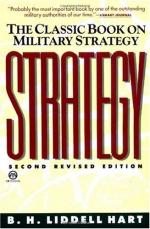
|
| Name: _________________________ | Period: ___________________ |
This test consists of 15 multiple choice questions and 5 short answer questions.
Multiple Choice Questions
1. According to the author, what type of government is least capable of creating ideal generals?
(a) Dictatorship.
(b) Democracy.
(c) Fascism.
(d) Communism.
2. What bias are generals likely to carry during war councils?
(a) They do not want to use thier own forces in an offensive.
(b) They favor the armies and fronts under their command.
(c) They trust their own superiors rather than the high command.
(d) They are usually concerned about their careers more than victory.
3. Which of the following historical commanders did NOT enjoy supreme power in both military and political matters, as did Hitler?
(a) Napoleon.
(b) Caesar.
(c) Alexander.
(d) Hannibal.
4. According to the author, how should formations be arranged?
(a) According to the design of unit commanders.
(b) With the best troops handling the most fighting.
(c) In a way that allows for rapid adjustments.
(d) In the way that most confuses the enemy.
5. Overall, what is the quality of Hitler's generalship?
(a) He was a decent commander, but always used direct approaches.
(b) He was unskilled with the indirect approach.
(c) He was totally inept.
(d) He was an excellent general.
6. Which of the following was a factor in limiting the possibilities for strategy on the eastern front?
(a) Insufficient manpower.
(b) Poorly trained generals.
(c) Dependance on railways.
(d) Lack of large artillery.
7. What is one of the main advantages of a large army?
(a) It can sustain significant loss of life.
(b) It can provide for itself.
(c) It cannot be defeated except by an equally large force.
(d) It can easily occupy and hold fortified locations.
8. How successful were the Austrians in the First World War?
(a) They did not gain or lose any land.
(b) They lost significant territory.
(c) The reconquered previously lost lands.
(d) They gained much new territory.
9. How successful were the Turks in repelling allied attacks in their region?
(a) Most regions held fast, but a few turned to the allied side.
(b) They held out only in a few limited areas.
(c) They repelled multiple invasions successfully.
(d) They failed completely to fend off the allies.
10. What field of military leadership generally applies to forces smaller than armies or fleets?
(a) Grand strategy.
(b) Diplomacy.
(c) Tactics.
(d) Strategy.
11. About how many Russian soldiers died on the eastern front during the First World War?
(a) Five-hundred thousand.
(b) Two-hundred thousand.
(c) One-hundred thousand.
(d) One million.
12. How were Arab nations vulnerable during the First World War?
(a) They could not afford much loss of manpower.
(b) Their supplies were extremely limited.
(c) They had almost no communication or chain of command.
(d) They had no real firearms.
13. Which of the following nations was NOT a major player in the war on the eastern front?
(a) Russia.
(b) Austria.
(c) Poland.
(d) Prussia.
14. What is meant by "strength faces strength"?
(a) An army's front should always face the front of the opposing army.
(b) Strong nations only engage other strong nations.
(c) Armies will generally concentrate forces near each other.
(d) Heavy weapons and armor demand equally heavy arms in order to oppose.
15. What historical general is cited as basing his conquests on popular support?
(a) Belisarius.
(b) Caesar.
(c) Hannibal.
(d) William of Normany.
Short Answer Questions
1. Which of the following outcomes is NOT specifically mentioned as being important to plan for?
2. Which war did Clausewitz's writings have a major impact on?
3. What is one of the main advantages of a small army?
4. What is meant by "flexibility" in strategic terms?
5. How did Hitler secure the loyalty of the commanders serving under him?
|
This section contains 641 words (approx. 3 pages at 300 words per page) |

|




